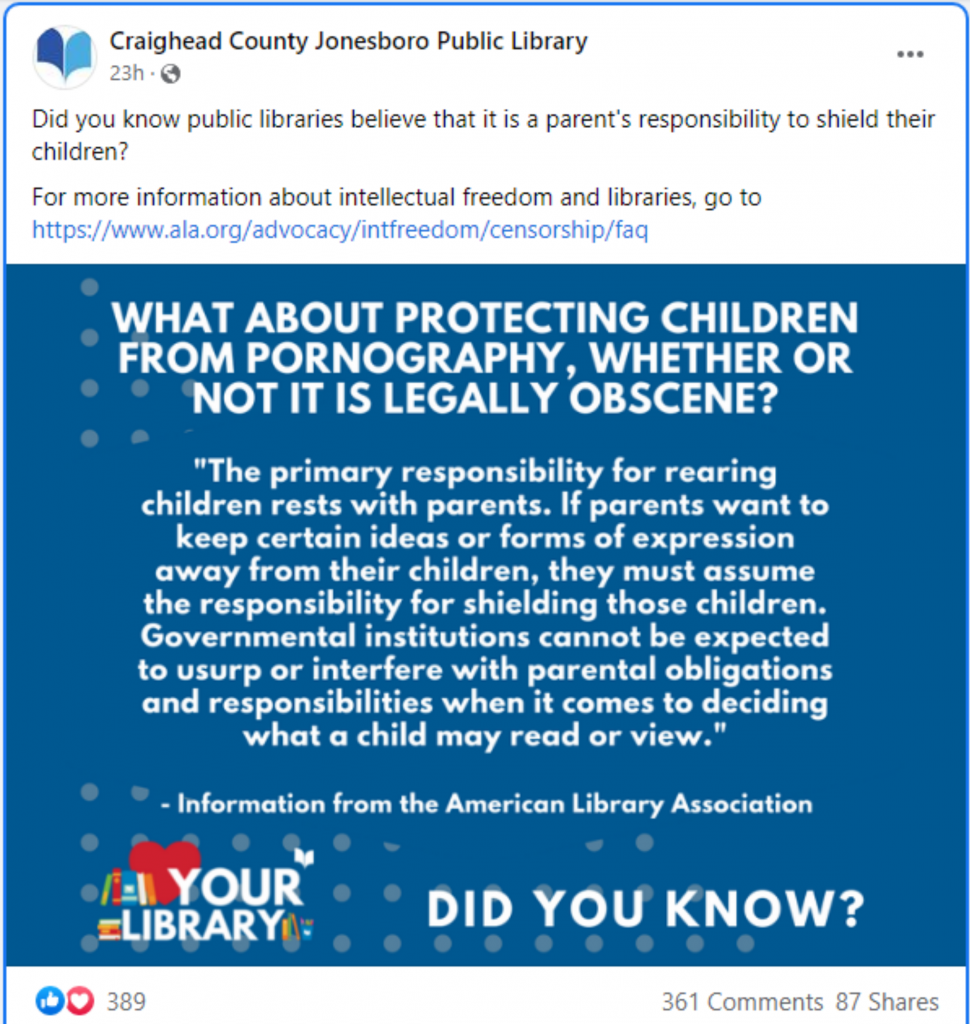Updated 3/2/2022 at 11:00 AM: As of Wednesday morning, it appears Jonesboro Public Library’s Facebook post has been taken down. Original blog post is below:

On Monday the Jonesboro Public Library made a statement on Facebook asserting that the library isn’t responsible if children see pornographic or obscene material on its shelves.
Last year the library made headlines after a lawsuit revealed that extremely graphic material was on the shelves in the children’s section of the Jonesboro library. Some of the material was so explicit that it could not be shown on television, and Family Council did not feel comfortable sharing it on the Internet.
Since then, the library’s board has failed to adopt policies that would move explicit material out of the children’s section of the library.
Under Arkansas law, it is a crime to distribute obscene material — that is, material that depicts or describes sexual conduct in a patently offensive manner and lacks serious literary, artistic, political, or scientific value. Arkansas law restricts pornographic material as well, and it is generally against the law to sell or loan pornography to minors.
However, Arkansas law contains exceptions for obscene material distributed by a school, museum, or public library. It isn’t against state law for one of these institutions to distribute obscene material — even to children.
Obviously, that is a loophole in state law that many people find troubling.
The Jonesboro Public Library’s Facebook post from Monday quotes the American Library Association on censorship and pornography, writing,
What About Protecting Children From Pornography, Whether Or Not It Is Legally Obscene?
The primary responsibility for rearing children rests with parents. If parents want to keep certain ideas or forms of expression away from their children, they must assume the responsibility for shielding those children. Governmental institutions cannot be expected to usurp or interfere with parental obligations and responsibilities when it comes to deciding what a child may read or view.
The statement tries to use parental rights and responsibility to justify putting obscene material where kids may find it in a public library.
The Jonesboro Public Library basically is saying that if kids see obscene material on the shelves in the children’s section, it’s the parents’ fault — not the library’s.
Despite all of this, communities still can take steps to remove obscene or objectionable material from their local libraries.
Library boards and librarians have leeway to establish selection criteria and make decisions about the kinds of material available on the library’s shelves. That is something that many people have asked the library board in Jonesboro to do.
Library patrons generally can use a Material Reconsideration Form to ask libraries to remove obscene or inappropriate material.
And voters can call on their elected officials to enact laws protecting children from obscene and pornographic material in public libraries.
It’s ridiculous to think that the library isn’t in any way to blame if a child finds pornographic or obscene material in the library’s children’s section. Unfortunately, the Jonesboro Public Library appears to be saying exactly that.
Articles appearing on this website are written with the aid of Family Council’s researchers and writers.



